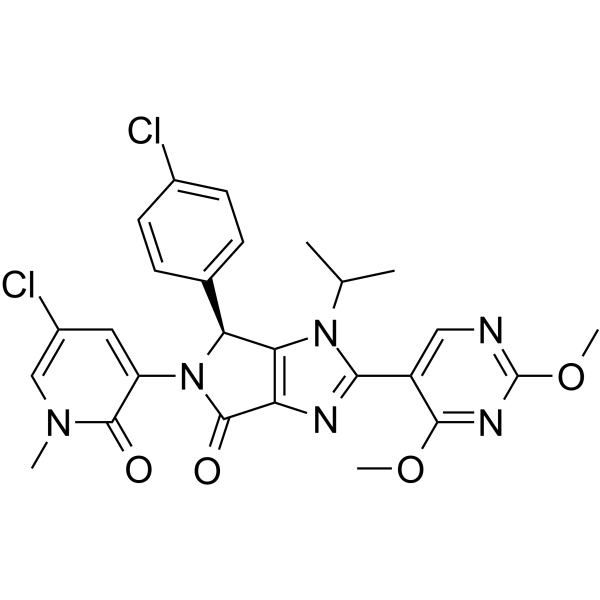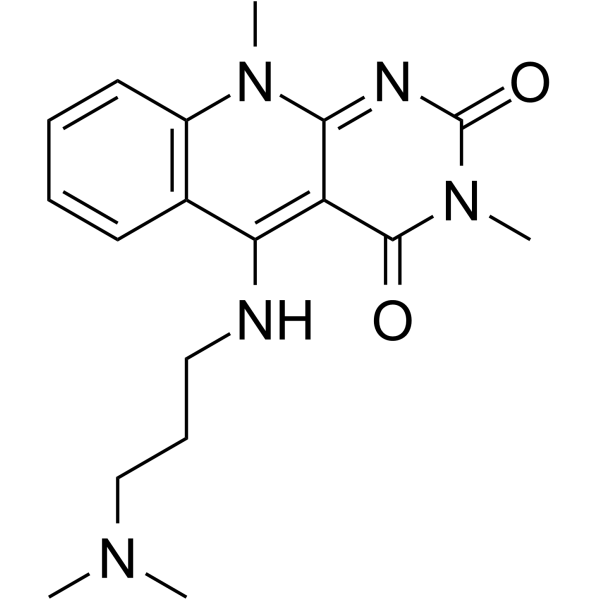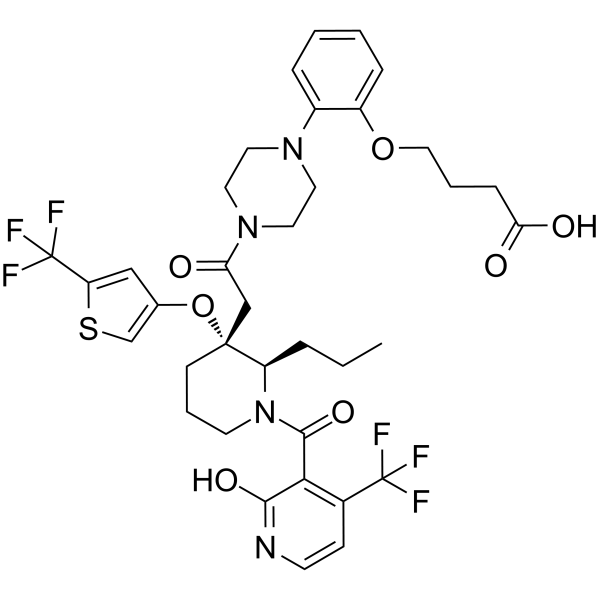上海金畔生物科技有限公司为生命科学和医药研发人员提供生物活性分子抑制剂、激动剂、特异性抑制剂、化合物库、重组蛋白,专注于信号通路和疾病研究领域。
Siremadlin (Synonyms: NVP-HDM201; HDM201) 纯度: 99.82%
Siremadlin (NVP-HDM201) 是口服有效的选择性 p53-MDM2 抑制剂。

Siremadlin Chemical Structure
CAS No. : 1448867-41-1
| 规格 | 价格 | 是否有货 | 数量 |
|---|---|---|---|
| 10 mM * 1 mL in DMSO | ¥2566 | In-stock | |
| 1 mg | ¥750 | In-stock | |
| 5 mg | ¥2100 | In-stock | |
| 10 mg | ¥3200 | In-stock | |
| 50 mg | ¥11000 | In-stock | |
| 100 mg | ¥17500 | In-stock | |
| 200 mg | 询价 | ||
| 500 mg | 询价 |
* Please select Quantity before adding items.
Siremadlin 相关产品
•相关化合物库:
- Drug Repurposing Compound Library Plus
- Clinical Compound Library Plus
- Bioactive Compound Library Plus
- Apoptosis Compound Library
- Metabolism/Protease Compound Library
- Anti-Cancer Compound Library
- Clinical Compound Library
- Autophagy Compound Library
- Anti-Aging Compound Library
- Drug Repurposing Compound Library
- Oxygen Sensing Compound Library
- Ubiquitination Compound Library
- Ferroptosis Compound Library
- Pyroptosis Compound Library
- Orally Active Compound Library
- Glutamine Metabolism Compound Library
- Anti-Pancreatic Cancer Compound Library
- Anti-Blood Cancer Compound Library
- Transcription Factor Targeted Library
- Anti-Liver Cancer Compound Library
- Anti-Colorectal Cancer Compound Library
| 生物活性 |
Siremadlin (NVP-HDM201) is a potent, orally bioavailable and highly specific p53-MDM2 interaction inhibitor. |
||||||||||||||||
|---|---|---|---|---|---|---|---|---|---|---|---|---|---|---|---|---|---|
| 体外研究 (In Vitro) |
Siremadlin (NVP-HDM201) disrupts both human and murine TP53- MDM2 interactions, with nanomolar cellular IC50 values, blocking TP53 degradation[1]. 上海金畔生物科技有限公司 has not independently confirmed the accuracy of these methods. They are for reference only. |
||||||||||||||||
| 体内研究 (In Vivo) |
Siremadlin (NVP-HDM201) is an imidazolopyrrolidinone analogue, showing a very advantageous in vivo profile. NVP-HDM201 has recently entered Phase 1 clinical trials in cancer patients[2]. Constitutive PB mutagenesis in Arf−/− mice provides a collection of spontaneous tumors with characterized insertional genetic landscapes. Tumors are allografted in large cohorts of mice to assess the pharmacologic effects of Siremadlin (NVP-HDM201). Sixteen out of 21 allograft models are sensitive to Siremadlin (NVP-HDM201) but ultimately relapse under treatment. A comparison of tumors with acquired resistance to Siremadlin (NVP-HDM201) and untreated tumors identified 87 genes that are differentially and significantly targeted by the PB transposon[1]. Siremadlin (NVP-HDM201) administered either daily at a low dose or once at a high dose revealed a differentiated engagement of the p53 molecular response. In contrast to the daily low dose treatment regimen, the single high dose Siremadlin (NVP-HDM201) regimen results in a rapid and dramatic induction of p53-dependent PUMA expression and apoptosis. This is consistent with the finding that a single high dose Siremadlin (NVP-HDM201) treatment, administered orally or intravenously, results in a robust and sustained tumor regression. Overall, both daily and once every 3 weeks dosing regimen shows comparable long term efficacy in preclinical studies. The ongoing clinical trial is currently designed to compare both dosing regimens with regard to efficacy and tolerability[3]. 上海金畔生物科技有限公司 has not independently confirmed the accuracy of these methods. They are for reference only. |
||||||||||||||||
| Clinical Trial |
|
||||||||||||||||
| 分子量 |
555.41 |
||||||||||||||||
| Formula |
C26H24Cl2N6O4 |
||||||||||||||||
| CAS 号 |
1448867-41-1 |
||||||||||||||||
| 运输条件 |
Room temperature in continental US; may vary elsewhere. |
||||||||||||||||
| 储存方式 |
|
||||||||||||||||
| 溶解性数据 |
In Vitro:
DMSO : ≥ 56.75 mg/mL (102.18 mM) * “≥” means soluble, but saturation unknown. 配制储备液
*
请根据产品在不同溶剂中的溶解度选择合适的溶剂配制储备液;一旦配成溶液,请分装保存,避免反复冻融造成的产品失效。 In Vivo:
请根据您的实验动物和给药方式选择适当的溶解方案。以下溶解方案都请先按照 In Vitro 方式配制澄清的储备液,再依次添加助溶剂: ——为保证实验结果的可靠性,澄清的储备液可以根据储存条件,适当保存;体内实验的工作液,建议您现用现配,当天使用; 以下溶剂前显示的百
|
||||||||||||||||
| 参考文献 |
|
所有产品仅用作科学研究或药证申报,我们不为任何个人用途提供产品和服务


